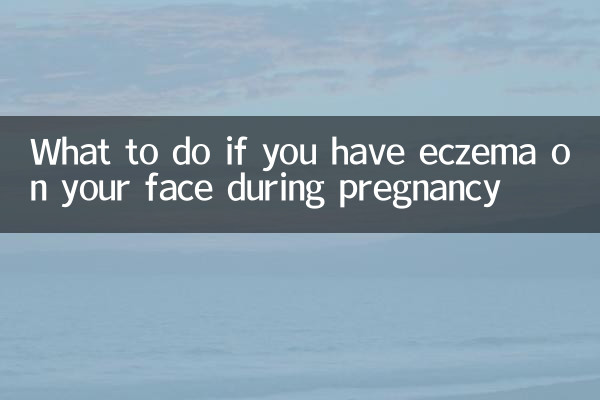What to do if you have eczema on your face during pregnancy
During pregnancy, many expectant mothers may experience skin problems, especially eczema on the face, due to changes in hormone levels and adjustments in the immune system. This not only affects appearance but may also cause discomfort. This article will combine hot topics and hot content in the past 10 days to provide you with scientific and practical solutions.
1. Common causes of eczema on face during pregnancy

Common causes of eczema on the face during pregnancy include:
| Reason | Description |
|---|---|
| Hormone changes | Estrogen and progesterone levels rise during pregnancy, which can lead to skin sensitivity and eczema. |
| Immune system adjustments | The immune system adjusts to accommodate fetal development, which may trigger an inflammatory response in the skin. |
| environmental factors | Eczema can be triggered by external stimuli such as dry air, cosmetics or detergents. |
| genetic factors | Pregnant women with a family history of eczema are more likely to develop skin problems. |
2. Care methods for eczema on face during pregnancy
For eczema on the face during pregnancy, you can take the following care methods:
| Nursing methods | Specific measures |
|---|---|
| gentle cleansing | Use gentle cleansers and avoid over-cleansing or harsh ingredients. |
| Moisturizing and repairing | Choose a natural, additive-free moisturizer, such as one containing ceramides or hyaluronic acid. |
| avoid scratching | When the eczema area is itchy, you can use cold compress to relieve it and avoid scratching which may lead to infection. |
| diet modification | Reduce spicy, seafood and other allergy-inducing foods, and consume more vitamin-rich fruits and vegetables. |
3. Treatment suggestions for eczema on face during pregnancy
If the symptoms of eczema are severe, it is recommended to receive treatment under the guidance of a doctor:
| Treatment | Things to note |
|---|---|
| topical medications | Choose weak hormone ointments (such as hydrocortisone) that are safe during pregnancy and avoid long-term use. |
| Oral medications | In severe cases, you can take antihistamines under the guidance of a doctor, but you need to choose carefully. |
| physical therapy | Ultraviolet therapy (need to be carried out under the guidance of a professional doctor). |
4. Popular questions and answers: Frequently asked questions about eczema on face during pregnancy
According to the hot topics on the Internet in the past 10 days, the following are some of the issues that expectant mothers are most concerned about:
1. Will eczema on the face during pregnancy affect the fetus?
Simple eczema usually does not affect the health of the fetus, but care should be taken to avoid using drugs that are harmful to the fetus.
2. Can eczema be transmitted to babies?
Eczema is not an infectious disease and cannot be passed on to your baby, but it may be hereditary.
3. How to distinguish eczema from other skin problems?
Eczema usually presents as dryness, erythema, itching, and sometimes exudation in severe cases; acne is mostly comedones or pustules; prurigo of pregnancy is mainly characterized by severe itching.
5. Tips to prevent eczema on face during pregnancy
Prevention is better than cure, here are some effective ways to prevent eczema:
| Precautions | Specific methods |
|---|---|
| Maintain appropriate humidity | Indoor humidity should be controlled at 40%-60% to prevent the air from being too dry. |
| Choose pure cotton clothing | Avoid wearing chemical fiber clothing to reduce skin irritation. |
| sun protection | Use physical sunscreen to prevent UV rays from aggravating skin problems. |
| Reduce stress and relax | Stress may induce or aggravate eczema, so it is appropriate to practice yoga or meditation during pregnancy. |
6. Summary
Eczema on the face is a common phenomenon during pregnancy, and expectant mothers don’t need to worry too much. Most symptoms of eczema can be effectively controlled through scientific care, proper diet, and medical intervention when necessary. It is important to maintain a good attitude and avoid worsening symptoms due to anxiety. If symptoms continue to worsen or are accompanied by other discomforts, you should seek medical treatment in time.
Final reminder: Any treatment plan should be carried out under the guidance of a professional doctor, and do not self-medicate to avoid affecting the health of the fetus.

check the details

check the details